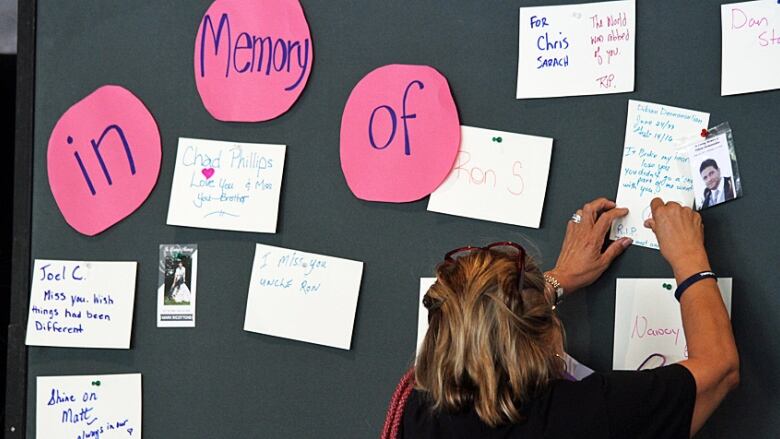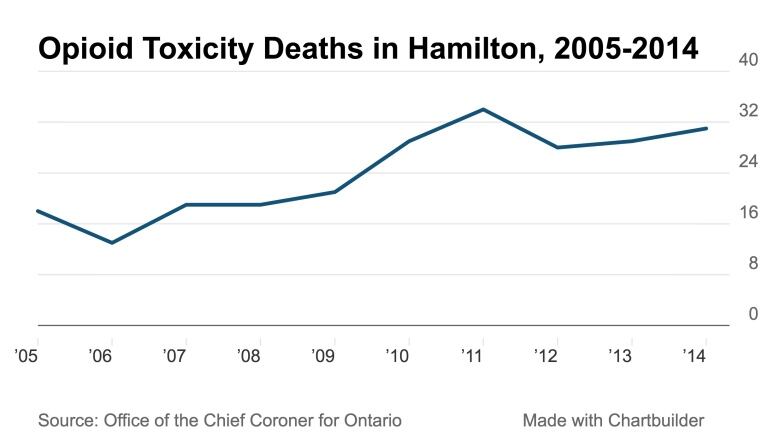Opioid overdose deaths nearly double, as Hamilton's dead remembered
Number of overdose deaths involving opioids almost double from 18 in 2004 to 34 in 2011

The names of the dead rang out in front of city hall today a roll call of the Hamiltonians who have died because of overdose in recent years.
"Moustache Tom.
"Mike.
"Burnsy."
Kelly Smartstarted the call, reading the first names of the peoplethat he had lost, his voice shaking slightly.
"Burnsy's gone? Not Burnsy," one man said afterwards, shaking his head.
It was the human face of addiction and as the city marked International Overdose Awareness Day withan event on the city hall steps, officials say the devastating impact drug overdose can have on a community cannot be ignored.
But amid all that darkness, a crack of light shone through. Smart, who overcamedecades-longaddiction issues himself,preachedto the crowd of about 100the importancethe city's lifesaving naloxonekitsand gave a firsthand accountabout how theysavelives.
In 2005, 18 people died of opioid toxicity in Hamilton. That number peaked at 34 in 2011, and continues to stay high at 31 in 2014:

The most common opioids associated with these deaths are oxycodone and morphine, health officials say.
Smart, 51, has been clean for two years. He's lost a lot of friends but saved some, too. He says he has personally used threeNaloxone kits on people who wereoverdosing.
"It brings them right out of it, and they won't use drugs for the next few days," Smart said.
"And that one person you save affects so many people around that person."
- Prescription painkillers fuelling crime in Hamilton
- Overdose prevention kits in Hamilton saved lives
Naloxoneis anopioidantagonist that was first developed in the1960s. When injected into a person who is overdosing, it can reverse the effects of prescription opiates for about 10 minutes, which is long enough to get them to hospital.
Each kit costs about $48 and is paid for by a provincial program.Over the past two years thecity hasdistributed 582 of the kitsfor freeto addicts and people close tothem.
The city says since then thekits have been used 148 times.
Smart insists the kits are vitallyimportant in a drug culture where there is a fear of calling for help when someone begins to overdose, because of a preconception that it will lead to criminal charges. The kits allow safety to be the first priority, he says.
"Everyone should learn how to do it," he said.

Increasingly, naloxone has become more of a necessity in Hamilton. The city has noted the powerful prescription painkiller fentanyl as a particular concern and that comes as police and community groups warn of a looming crisis involving so-called "bootleg" versions of the drug.
An advisory released Monday by the Ontario Association of Chiefs of Police says 2016 has been a record year for overdose alerts and seizures of bootleg fentanyl.
That refers to drugs that are not prescribed by doctors, but produced synthetically and sold on the black market, usually mixed in with other substances.
Synthetic versions of the drug include carefentanil, which is often used as an elephant tranquilizer, and W-18, a drug that has prompted warnings from police in several Canadian cities.
The city's Associate Medical Officer of Health Dr. Jessica Hopkins told CBC News that there is a worry at the Public Health unit about these drugs seeping onto Hamilton's streets.
She pointed to the yearly average of 30 overdose deaths that the city is now seeing as unacceptable.
"These are 30 preventable deaths," she said. "We need to meet people where they're at. Not everyone is ready to go into addiction treatment."
"Every single loss due to overdose is important," she told the crowd.
Ward 3 Coun. Matthew Green also spoke at the event, and stressed the need to humanize the statistics that are talked about at different levels of government.
"Addictions don't care what you look like, how much money you have, what race you are or what god you pray to," he said. "It's a citywide issue."
Karen Flynn echoed that sentiment. She too has dealt with addictions, but has now been clean for over two years.
"Addicts are looked like as scum, like they're not a human being and that's not fair," she said.
"They just didn't know the person they were."
Anyone looking for help or information about addictions services in Hamilton can call the drug and alcohol addiction helpline at 1-800-565-8603.
With files from The Canadian Press and Gemma Karstens-Smith













_(720p).jpg)


 OFFICIAL HD MUSIC VIDEO.jpg)
.jpg)



























































































